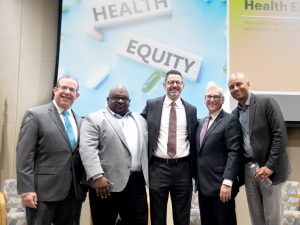
The Hagedorn Lecture on Corporate Social Responsibility at the Robert B. Willumstad School of Business explored how investing in health equity can reduce costs, improve outcomes and strengthen communities—benefiting businesses and society alike.
Embracing ethical practices has been intrinsic to the Robert B. Willumstad School of Business since its founding — both for business and personal actions.
Embracing ethical practices has been intrinsic to the Robert B. Willumstad School of Business since its founding as the School of Business Administration in 1964, both for business and personal actions. In recent decades, that ethos has evolved toward a more structured approach to teaching corporate social responsibility.
In 2003, a gift from the late Amy Hagedorn ’05 (Hon.) and Miracle-Gro’s founder, the late Horace Hagedorn ’01 (Hon.), established the annual Hagedorn Lecture Series on Corporate Social Responsibility.
Prominent speakers address pressing issues of the day. Past speakers have included the CEO of American Express, the retired chair and CEO of the KeySpan Corporation, a Wall Street industry expert, the CEO of The Scotts Company, the former United States Secretary of the Treasury, Robert Rubin and executives from Curaleaf.

The Hagedorn Lecture on Corporate Social Responsibility at the Robert B. Willumstad School of Business explored how investing in health equity can reduce costs, improve outcomes and strengthen communities—benefiting businesses and society alike.